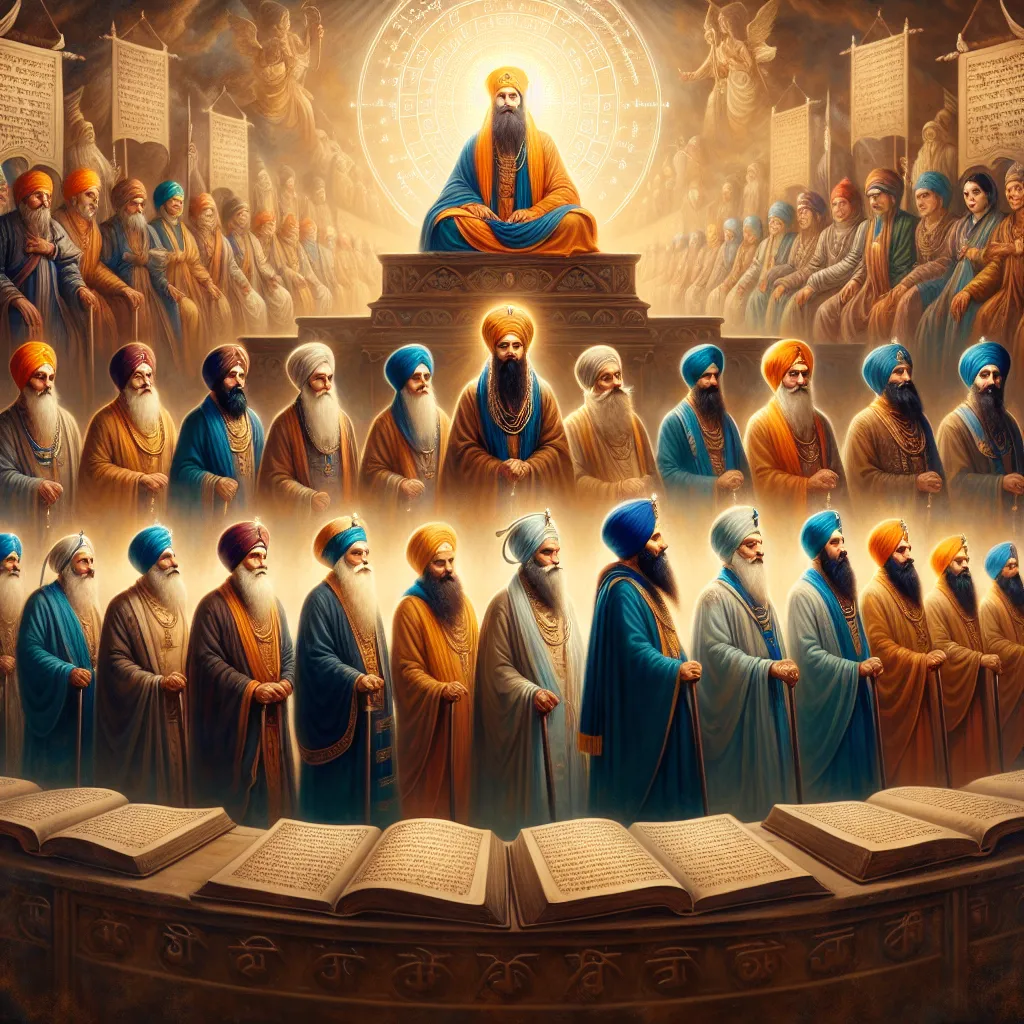
- Published on
- Authors

- Name
- You
The Ten Gurus of Sikhism: A Legacy of Spiritual Leadership
Sikhism, one of the youngest and major world religions, is a profound blend of mystical wisdom and advanced teachings on personal and communal ethics. Central to Sikhism are the ten Gurus, whose teachings and lives have left an everlasting impact on its followers. This article delves into their legacy, highlighting each Guru's unique contributions to the Sikh faith.
Introduction
The ten Sikh Gurus are revered figures who transcended their times to impart spiritual and practical wisdom. Their teachings form the foundation of Sikhism, emphasizing equality, justice, and devotion to a single, formless God.
1. Guru Nanak Dev Ji (1469-1539)
Life and Teachings: Guru Nanak Dev Ji, the founder of Sikhism, preached the unity of God and the brotherhood of mankind. Emphasizing the importance of meditation and honest living, he travelled widely, spreading his message of humility and service.
Key Contributions:
- Advocated for the equality of all, regardless of caste or creed.
- Established the foundation of Sikhism with three central tenets: Naam Japna (chanting the Name of God), Kirat Karni (earning an honest living), and Vand Chakna (sharing with others).
2. Guru Angad Dev Ji (1504-1552)
Life and Teachings: Guru Angad Dev Ji was instrumental in establishing the Gurumukhi script, which preserved the sacred teachings and ensured their wide dissemination.
Key Contributions:
- Introduced the Gurumukhi script.
- Promoted physical fitness and health through wrestling and other exercises.
3. Guru Amar Das Ji (1479-1574)
Life and Teachings: Known for his humility and service, Guru Amar Das Ji rejected the caste system and social stratification, instilling a deep sense of community among his followers.
Key Contributions:
- Established Langar (community kitchen) where all could eat together, regardless of social status.
- Organized the Sikh community into distinct congregations known as Manjis.
4. Guru Ram Das Ji (1534-1581)
Life and Teachings: Guru Ram Das Ji founded the city of Amritsar, which would become the spiritual center of Sikhism, fostering a strong sense of identity and place.
Key Contributions:
- Composed hymns that are part of the Guru Granth Sahib.
- Laid the foundation of Amritsar and initiated the construction of the Harmandir Sahib (Golden Temple).
5. Guru Arjan Dev Ji (1563-1606)
Life and Teachings: A scholar and visionary, Guru Arjan Dev Ji compiled the Adi Granth, the sacred scripture of Sikhism, reinforcing the spiritual and philosophical foundation of the religion.
Key Contributions:
- Compiled the Adi Granth.
- Executed by Mughal authorities, exemplifying the principle of sacrifice for faith.
6. Guru Hargobind Ji (1595-1644)
Life and Teachings: Guru Hargobind Ji introduced the concept of Miri-Piri, signifying the temporal and spiritual authority of the Guru, preparing the Sikh community to defend their faith.
Key Contributions:
- Wore two swords, symbolizing spiritual and temporal power.
- Built the Akal Takht (Throne of the Timeless One) in Amritsar.
7. Guru Har Rai Ji (1630-1661)
Life and Teachings: Known for his compassion and healing, Guru Har Rai Ji emphasized the balance between martial strength and spiritual wisdom.
Key Contributions:
- Advanced the cause of herbal medicine and human service.
- Continued the military traditions while maintaining a strong focus on spiritual duties.
8. Guru Har Krishan Ji (1656-1664)
Life and Teachings: A child prodigy, Guru Har Krishan Ji's brief tenure as Guru underscored purity and selflessness, notwithstanding his young age.
Key Contributions:
- Known as the "Bal Guru" (Child Guru).
- Served and healed the afflicted during a smallpox epidemic in Delhi.
9. Guru Tegh Bahadur Ji (1621-1675)
Life and Teachings: A beacon of courage, Guru Tegh Bahadur Ji stood up against religious persecution, becoming a symbol of sacrifice for the freedom to practice one’s faith.
Key Contributions:
- Martyred for defending the religious rights of Hindus against forced conversion by Mughal rule.
- Authored numerous hymns included in the Guru Granth Sahib, focusing on detachment and divine meditation.
10. Guru Gobind Singh Ji (1666-1708)
Life and Teachings: The tenth Guru, Guru Gobind Singh Ji, established the Khalsa, a collective body of initiated Sikhs, embodying the highest Sikh virtues and readiness to protect the faith.
Key Contributions:
- Founded the Khalsa in 1699, transforming the Sikh community into a brotherhood of saints and soldiers.
- Compiled the final version of the Guru Granth Sahib, declaring it the eternal Guru of Sikhs.
Conclusion
The ten Sikh Gurus' legacy is a rich tapestry of spiritual guidance, practical wisdom, and unparalleled leadership. Their teachings continue to inspire millions, guiding individuals towards a life of devotion, equality, and righteous action. Sikhism's message is universal—underscoring the unity of humanity, the oneness of God, and the importance of living a disciplined, service-oriented life.
By exploring the lives and contributions of the Sikh Gurus, we not only gain deeper insights into Sikhism but also uncover timeless principles that can guide us all towards a more harmonious and enlightened existence.
